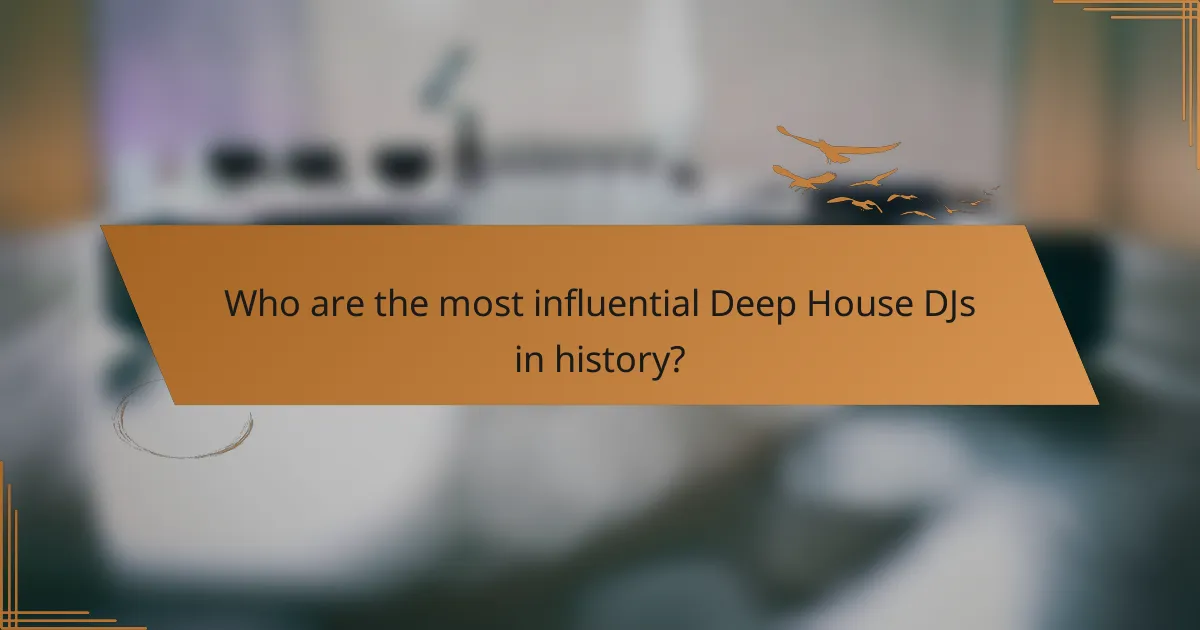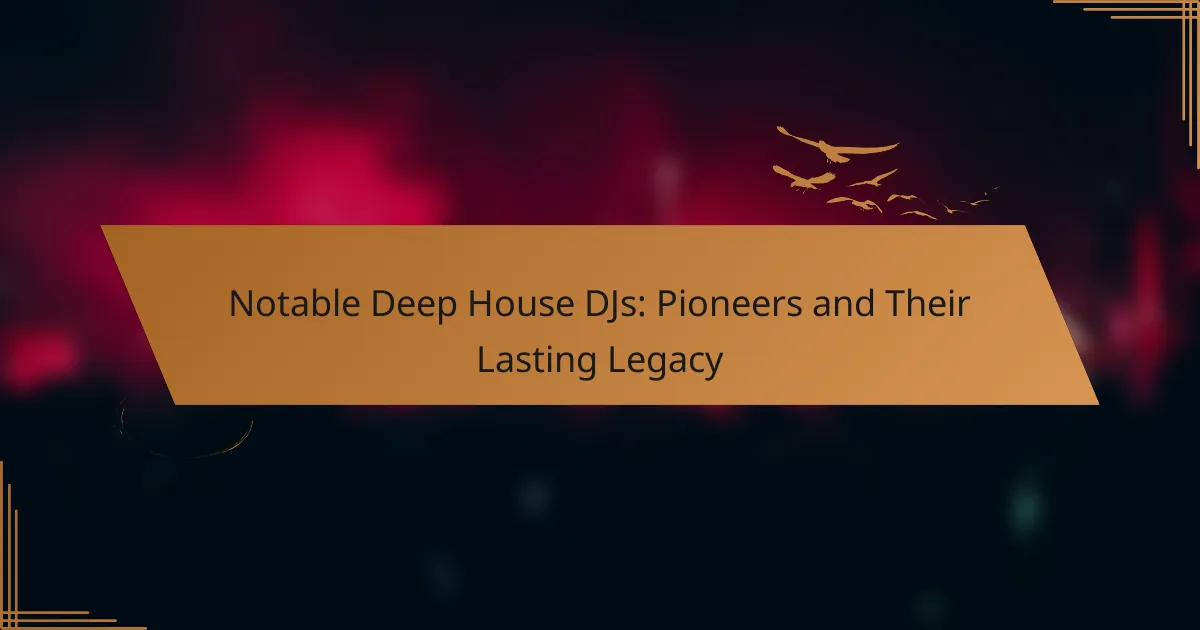Notable Deep House DJs are key figures in the evolution of electronic music, recognized for their unique sound, technical skills, and significant influence on the genre. Pioneers such as Larry Heard, Frankie Knuckles, and Kerri Chandler have established foundational styles characterized by complex melodies and rich basslines. Their contributions have shaped deep house music, blending elements of jazz, soul, and funk, and inspiring a global community of artists and producers. This article explores the legacy of these influential DJs, their distinctive production styles, and their impact on music festivals and clubs around the world.

What defines notable Deep House DJs?
Notable Deep House DJs are defined by their unique sound, technical skills, and influence on the genre. They often blend elements of jazz, soul, and funk into their music. Their ability to create immersive atmospheres sets them apart. Many notable DJs have a distinctive production style that resonates with audiences. They typically release original tracks and remixes that gain significant traction. Their performances showcase a deep understanding of crowd dynamics. Notable DJs often participate in influential music festivals and clubs. Their contributions help shape the evolution of Deep House music.
How did the Deep House genre emerge and evolve?
Deep House emerged in the 1980s as a subgenre of house music. It combines elements of jazz, soul, and funk with electronic music. Pioneers like Larry Heard and Frankie Knuckles played crucial roles in its development. The genre is characterized by its use of smooth, melodic sounds and deep basslines. In the 1990s, Deep House gained popularity in clubs and on radio stations. The rise of digital music platforms in the 2000s further expanded its reach. Artists like Kerri Chandler and Theo Parrish contributed to its evolution by incorporating diverse influences. Today, Deep House continues to thrive in various music scenes worldwide.
What are the key characteristics of Deep House music?
Deep House music is characterized by its smooth, soulful sound and emphasis on melody. It typically features a tempo range of 120 to 125 beats per minute. The genre often incorporates jazz, funk, and soul elements. Deep basslines are a prominent feature, creating a rich soundscape. Vocals in Deep House are often soft and melodic, adding to the overall atmosphere. Chord progressions tend to be complex and lush, enhancing emotional depth. The use of synthesizers and ambient sounds contributes to its immersive quality. Deep House music emerged in the 1980s, influenced by Chicago house and Detroit techno.
Who were the early pioneers of Deep House?
The early pioneers of Deep House include Larry Heard, Frankie Knuckles, and Mr. Fingers. Larry Heard, also known as Mr. Fingers, is credited with producing some of the genre’s foundational tracks in the mid-1980s. Frankie Knuckles, often referred to as the “Godfather of House,” played a crucial role in shaping the sound of Deep House in Chicago. Their work laid the groundwork for the genre’s development, blending elements of soul, jazz, and funk. Tracks like “Can You Feel It” by Mr. Fingers exemplify the deep, emotive sound that characterizes the genre. The influence of these pioneers is still evident in contemporary Deep House music.
What impact have notable Deep House DJs had on the music industry?
Notable Deep House DJs have significantly shaped the music industry by popularizing the deep house genre. They have influenced mainstream music trends and club culture. Artists like Larry Heard and Frankie Knuckles pioneered the sound in the 1980s. Their work laid the foundation for modern electronic music. The genre has expanded globally, impacting various music styles. Deep house elements are now prevalent in pop and mainstream tracks. Notable DJs have also contributed to the rise of music festivals and events. They have built large followings, creating a vibrant community around the genre.
How have these DJs influenced modern electronic music?
Notable deep house DJs have significantly influenced modern electronic music through innovative production techniques and genre blending. They introduced unique sounds that shaped the deep house genre, which has become a cornerstone of electronic music today. Pioneers like Frankie Knuckles and Larry Heard popularized soulful melodies and intricate rhythms. Their work laid the foundation for contemporary artists who now incorporate diverse influences into electronic tracks. The rise of digital platforms has allowed their music to reach a global audience, further embedding their styles in the mainstream. Additionally, their emphasis on live performances has inspired a new generation of DJs to prioritize audience engagement. This legacy is evident in the evolving soundscapes of modern electronic music.
In what ways have they shaped club culture and events?
Notable Deep House DJs have significantly shaped club culture and events through their innovative music styles and performance techniques. They have introduced unique sounds that blend various genres, creating a distinct atmosphere in clubs. Their ability to connect with audiences has transformed live performances into immersive experiences. DJs like Frankie Knuckles and Larry Heard pioneered deep house, influencing countless artists and reshaping the genre. Their events often feature extended sets, encouraging longer dance sessions and fostering a sense of community. This cultural shift emphasizes the importance of the DJ as a curator of sound and experience. The rise of festivals and club nights centered around deep house further illustrates this impact. Research shows that these DJs have contributed to the evolution of club spaces, making them more inclusive and diverse.

Who are the most influential Deep House DJs in history?
The most influential Deep House DJs in history include Larry Heard, Frankie Knuckles, and Kerri Chandler. Larry Heard, known as Mr. Fingers, is credited with pioneering the deep house sound in the 1980s. His track “Can You Feel It” is a seminal piece in the genre. Frankie Knuckles, often referred to as the “Godfather of House,” played a crucial role in shaping house music in Chicago. He produced iconic tracks like “Your Love” and “Baby Wants to Ride.” Kerri Chandler is recognized for his deep, soulful sound and has been a significant figure since the 1990s. His productions and DJ sets have greatly influenced the genre’s evolution. These DJs have left a lasting legacy in deep house music through their innovative styles and memorable tracks.
What contributions did Larry Heard make to Deep House?
Larry Heard is a foundational figure in Deep House music. He is known for blending soulful melodies with electronic beats. His track “Can You Feel It” is considered a classic and has influenced many artists. Heard’s use of lush chords and deep basslines defined the genre’s sound. He was instrumental in developing the Chicago House scene in the 1980s. His work with synthesizers and drum machines set a standard for future productions. Heard’s music often features emotive vocals and intricate arrangements. He continues to inspire new generations of Deep House producers with his innovative style.
What unique attributes define Larry Heard’s music style?
Larry Heard’s music style is defined by its deep, soulful melodies and intricate rhythms. His use of lush chords creates an immersive listening experience. Heard often incorporates jazz and funk elements into his tracks. This blend gives his music a unique character. He is known for his emotive vocal samples, which add depth to his productions. Heard’s tracks often feature smooth basslines that drive the groove. His innovative use of synthesizers contributes to a rich sonic texture. Additionally, he emphasizes a laid-back, yet danceable vibe in his compositions.
How has Larry Heard’s legacy influenced future artists?
Larry Heard’s legacy has profoundly influenced future artists by shaping the sound of deep house music. His innovative production techniques and unique blend of jazz, soul, and electronic elements set a standard for the genre. Artists like Frankie Knuckles and Kerri Chandler have cited Heard as a significant inspiration in their work. His track “Can You Feel It” is often regarded as a foundational deep house anthem. This track’s emotional depth and melodic complexity have encouraged artists to explore similar themes in their music. Heard’s commitment to authenticity and artistry has also motivated upcoming musicians to prioritize creative expression. As a result, many contemporary deep house artists continue to draw from his stylistic elements and philosophies. His influence is evident in the works of modern producers like Disclosure and Kaytranada, who incorporate his signature sound into their music.
How did Frankie Knuckles become known as the “Godfather of House”?
Frankie Knuckles became known as the “Godfather of House” due to his significant influence on the genre’s development. He played a pivotal role in the emergence of house music in the 1980s. Knuckles was a resident DJ at the Warehouse in Chicago, where he popularized the sound that would define house music. His innovative mixing techniques and use of drum machines and synthesizers set new standards for DJs. He produced iconic tracks like “Your Love” and “Baby Wants to Ride,” which became foundational in house music. Knuckles’ contributions to the genre were recognized with multiple awards, including a Grammy. His legacy continues to inspire new generations of musicians and DJs.
What are the key milestones in Frankie Knuckles’ career?
Frankie Knuckles’ career milestones include his early work as a DJ in New York City during the 1970s. He played at the Continental Baths alongside Larry Levan. In 1982, he moved to Chicago and is credited with helping to develop the house music genre. His remix of “Your Love” by Jamie Principle became a classic. In 1985, he opened the Warehouse club, which became a pivotal venue for house music. Knuckles received a Grammy Award in 1997 for his remix of “Tears” by Satoshi Tomiie. He was also honored with the title “Godfather of House Music” for his influence. In 2014, he passed away, leaving a lasting legacy in the music industry.
How does his work continue to resonate in today’s music scene?
His work continues to resonate in today’s music scene through its influence on contemporary deep house music. Many current artists cite his innovative sound as a major inspiration. His pioneering use of soulful melodies and intricate rhythms set a standard for modern producers. Tracks that incorporate his signature style are frequently played in clubs and festivals worldwide. His influence is evident in the rise of sub-genres that blend elements from his original compositions. Collaborations with new artists help keep his legacy alive. Additionally, remixes of his classic tracks remain popular, showcasing their timeless appeal. His contributions have shaped the evolution of electronic music, ensuring his relevance in today’s industry.

What is the lasting legacy of notable Deep House DJs?
Notable Deep House DJs have significantly influenced the evolution of electronic music. Their legacy includes the establishment of deep house as a respected genre. Pioneers like Larry Heard and Frankie Knuckles set foundational sounds and styles. They introduced complex melodies and rich basslines that define deep house. Their work inspired countless artists and producers globally. The blending of soulful vocals with electronic beats became a hallmark of the genre. Clubs and festivals around the world now celebrate deep house music. This genre continues to evolve while retaining the essence created by these DJs.
How have these DJs shaped the future of the Deep House genre?
Notable Deep House DJs have significantly influenced the genre’s evolution. They have introduced innovative sounds and techniques that expanded Deep House’s boundaries. Their unique styles have attracted diverse audiences, thus increasing the genre’s popularity. For instance, DJ Pierre’s use of acid elements in Deep House set a new standard in the 1980s. Similarly, Larry Heard’s emotive melodies and intricate production have redefined the genre’s emotional depth. These pioneers have also fostered collaborations across genres, blending Deep House with elements of techno and soul. As a result, their contributions have paved the way for new artists and subgenres, ensuring that Deep House continues to thrive in the music landscape.
What new trends have emerged from their influence?
New trends in deep house music have emerged from the influence of notable DJs. These trends include a fusion of genres, blending deep house with elements of techno, jazz, and soul. Collaborations between DJs and live musicians have increased, creating a more dynamic sound. The use of organic instruments in productions has become more prevalent. Additionally, there is a growing emphasis on vocal-driven tracks, enhancing emotional connection. The rise of digital platforms has also led to a surge in independent releases. These changes reflect the evolving landscape of deep house music, shaped by its pioneers.
How are new artists paying homage to these pioneers?
New artists are paying homage to deep house pioneers through music, remixes, and collaborations. They often sample classic tracks from these influential DJs. This practice keeps the original sounds alive while introducing them to new audiences. Additionally, many new artists cite these pioneers as key inspirations in interviews. They frequently reference the techniques and styles pioneered by these legends. Some host tribute events or festivals celebrating the legacy of deep house music. By doing so, they create a connection between past and present. This approach fosters appreciation for the genre’s history and evolution.
What can aspiring DJs learn from the pioneers of Deep House?
Aspiring DJs can learn the importance of blending genres from the pioneers of Deep House. These pioneers, such as Larry Heard and Frankie Knuckles, fused elements of soul, jazz, and funk. This genre-blending created a unique sound that defined Deep House. Additionally, aspiring DJs can learn about the significance of emotional connection in music. Pioneers emphasized creating a mood and atmosphere through their sets. They often used longer track durations to build tension and release. Furthermore, understanding the role of technology is crucial. Pioneers utilized early drum machines and synthesizers to shape their sound. This innovation laid the groundwork for modern production techniques. Lastly, networking and collaboration played a key role in their success. Pioneers often worked with other artists to enhance their music. This spirit of collaboration can inspire aspiring DJs to connect within their communities.
What best practices should new DJs adopt from these legends?
New DJs should adopt the practice of continuous learning from legendary DJs. They should study various genres and techniques to enhance their skills. Legendary DJs often emphasize the importance of knowing your audience. This helps in creating a connection during performances. Additionally, new DJs should invest in quality equipment. Legends often use reliable gear to ensure sound quality. Networking is another crucial practice. Building relationships in the industry can lead to opportunities. Finally, legendary DJs showcase their unique style. New DJs should find their voice while respecting the roots of the genre. These practices are essential for growth and success in the DJing landscape.
How can understanding their legacy enhance a DJ’s career?
Understanding their legacy can enhance a DJ’s career by providing inspiration and direction. Knowledge of pioneering DJs’ contributions helps current DJs innovate while respecting foundational elements. This understanding fosters a unique style that resonates with audiences. Additionally, it aids in building a personal brand aligned with the genre’s history. For instance, DJs like Frankie Knuckles and Larry Heard shaped deep house, influencing countless artists today. By studying their techniques and philosophies, DJs can create music that honors tradition while pushing boundaries. This connection to legacy can also enhance networking opportunities within the industry.
Notable Deep House DJs are pivotal figures in the evolution of electronic music, renowned for their unique sound and technical skills. The article explores the emergence of the Deep House genre in the 1980s, highlighting key pioneers such as Larry Heard and Frankie Knuckles who shaped its foundational sound. It details the characteristics of Deep House music, the impact of these DJs on club culture, and their lasting legacy within the music industry. Additionally, the article examines how modern artists continue to draw inspiration from these pioneers, ensuring the genre’s ongoing relevance and evolution.
